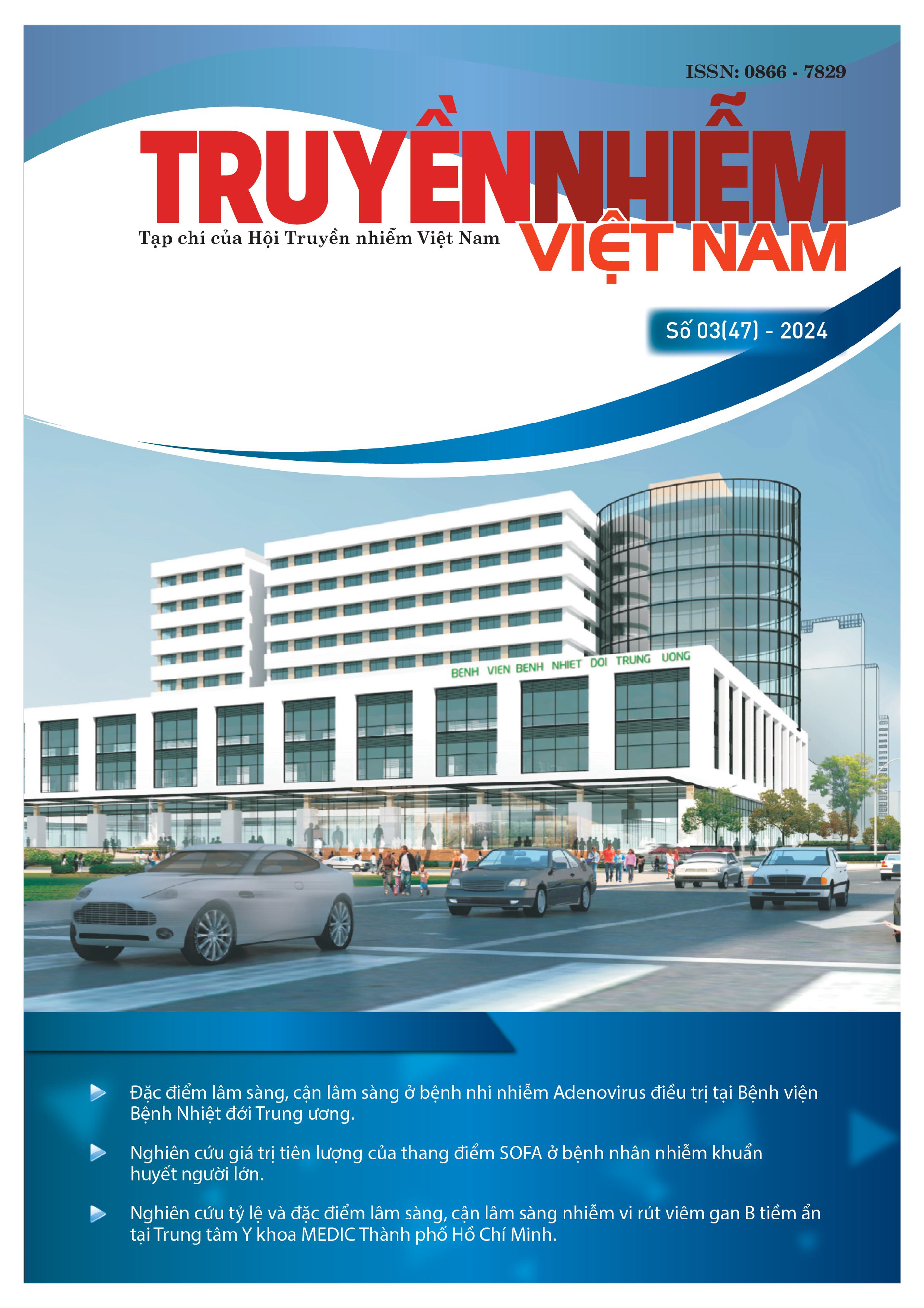ASSESSMENT OF COMPLIANCE WITH ARV AND SOME RELATED FACTORS OF HIV/AIDS PATIENTS AT DA NANG DERMATOLOGY HOSPITAL
Main Article Content
Abstract
Background: Acquired immunodeficiency syndrome is caused by HIV, weakening the immune system and has become a global pandemic. Using of anti-HIV drugs (ARVs) is the only effective therapy to control
the amount of virus in the patient's body. People with HIV/AIDS are under mainly outpatient ARV treatment during their lifetime to maintain and improve their health.
Aims: 1. Assessing the level of adherence to ARV treatment of HIV/AIDS patients at Da Nang City Dermatology Hospital in 2022; 2. Identify some factors related to the adherence to ARV treatment.
Patients and method: The research used the cross - sectional method, analyses and tretrospect for over 260 medical records of patients who are receiving ARV treatment in Dermatology hospital Danang from
August 2022 to May 2023.
Ressults and conclusions: The result of research showed the men patients account for 82,3% of total pateints who under to ARV therapeutic method, the average age of patients following this research is at 34.6 ± 10.4. The percentage of patients compling with ARV treatment was assessed by USAID's Multidimensional Assessment Toolkit with 03 levels: high level is 44.2%, medium level is 38.2%, and low level is 17.7%. Factors related to treatment adherence: Education level (OR = 1.5; KTC 95%: 0.8 - 2.7); side effects of using drugs (OR = 7; 95% CI: 2.8 - 17.5); alcohol using (OR = 2.6; 95% CI: 1.2 - 4.1); treatment duration (OR = 2.0; 95% CI: 1.2 - 3.5); Difficulties of taking medication (OR = 2.2; 95% CI: 1.2 - 4.1).
Recommendations: It is necessary to focus on patient consultations about the side effects of taking drugs, alcohol using, the ways of medication reminder: Using phones, alarm - clocks or someone’s support. Patients must prepare enough medication when going away from home and get support from their family, friends and peer groups.
Article Details
Keywords
Human immunodefficiency virus, HIV/AIDS, ARV, compliance
References
2. Lê Tấn Đạt, Phạm Thị Vân Phương (2022), Tuân thủ điều trị ARV và các yếu tố liên quan ở bệnh nhân nhiễm HIV tại Khoa Tham vấn và hỗ trợ cộng đồng quận Bình Thạnh, Thành phố Hồ Chí Minh năm 2021. Tạp chí Y học TP. Hồ Chí Minh, 26 (2 ).
3. Đào Đức Giang (2019), Thực trạng tuân thủ điều trị ARV, một số yếu tố liên quan và hiệu quả can thiệp tại một số phòng khám ngoại trú tại Hà Nội, Viện Vệ sinh Dịch tễ Trung ương, Hà Nội.
4. Phan Thị Thu Hương (2017). Tuân thủ điều trị ARV và các yếu tố liên quan trên bệnh nhân AIDS đang được điều trị tại Trung tâm phòng chống HIV/AIDS tỉnh Hải Dương, năm 2016, Tạp chí Y học dự phòng. 27 (3), tr.
5. Nguyễn Thanh Long (2013). Đánh giá tuân thủ điều trị ARV của bệnh nhân HIV/AIDS tại phòng khám ngoại trú tỉnh Ninh Bình năm 2012. Tạp chí Y học Dự phòng, 2, tr. 47-53.
6. Hoàng Thị Mơ (2018), Đánh giá sự tuân thủ điều trị và một số yếu tố liên quan đến bệnh nhân điều trị ARV tại Trung tâm phòng, chống HIV/AIDS tỉnh Quảng Bình năm 2018, Luận văn Cao học Y tế công cộng, Trường Đại học Y - Dược Huế.
7. Võ Thị Năm (2010). Tỷ lệ và các yếu tố liên quan đến việc tuân thủ điều trị ARV ở bệnh nhân HIV/AIDS tại Thành phố Cần Thơ năm 2009. Tạp chí Y học TP. Hồ Chí Minh. 14 (1).
8. Nguyễn Thị Huyền Trang, Sa Phương Băng, Sa Trọng Kiên và cộng sự (2020). Tuân thủ điều trị ARV ở người nhiễm HIV/AIDS điều trị ngoại trú tại Bệnh viện đa khoa huyện Mường La, tỉnh Sơn La năm 2019 và một số yếu tố liên quan. Tạp chí Y học dự phòng, 30, (08), tr. 109-115.
9. Nguyễn Thị Mỹ Tiên (2016), Tỷ lệ tuân thủ điều trị ARV và các yếu tố liên quan trên bệnh nhân HIV/AIDS tại Trung tâm Y tế dự phòng quận 6, Tạp chí Y học TP. Hồ Chí Minh, 20 (5), tr. 133-138.
10. Trung tâm Kiểm soát Bệnh tật Thành phố Đà Nẵng (2023). Báo cáo số 1207/TTKSBT-HIV về Kết quả thực hiện nhiệm vụ 6 tháng đầu năm và phương hướng nhiệm vụ 6 tháng cuối năm 2023. Đà Nẵng.
11. Abadiga M, Hasen T, Mosisa G, Abdisa E (2020). Adherence to antiretroviral therapy and Associated factors among Human immunodeficiency virus positive patients accessing treatment at Nekemte referral hospital, west Ethiopia, 2019. PloS ONE, 15(5): e0232703.
12. Gavin Steel, Jude Nwokike, Mohan P. Joshi. Development of a Multi-Method Tool to Measure ART Adherence in Resource-Constrained Settings: The South Africa Experience. 2007. Rational Pharmaceutical Management Plus Program Center for Pharmaceutical Management Sciences for Health.
13. O.M. Minzi, H. Irunde, & C. Moshiro (2009), "HIV patients presenting common adverse drug events caused by highly active antiretroviral therapy in Tanzania", Tanzan J Health Res. 11(1), pp. 5-10.
14. TRAN, Bach Xuan et al (2013). Determinants of antiretroviral treatment adherence among HIV/ AIDS patients: a multisite study. Global Health Action, [S.l.], 6, pp.1654-9880.
15. UNAIDS (2021), Fact sheet - World AIDS day 2021, UNAIDS 2021 estimates and additional data are available at aidsinfo.unaids.org.
16. WHO (2013), Consolidated Guidelines on the Use of Antiretroviral Drugs for Treating and Preventing HIV infection, Geneva.


